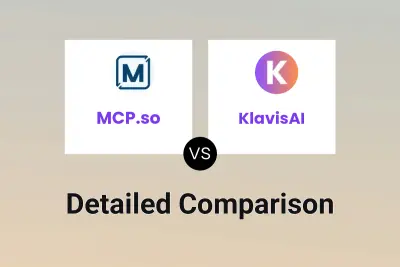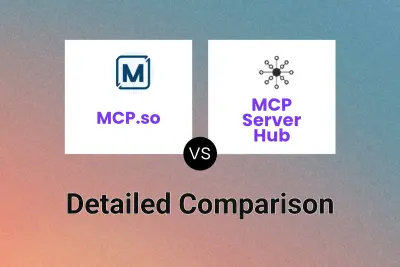 MCP.so
VS
MCP.so
VS
 MCP Server Hub
MCP Server Hub
MCP.so
MCP.so serves as a comprehensive, community-driven platform dedicated to collecting and organizing third-party MCP (Model Context Protocol) Servers and Clients. MCP is an open-source protocol enabling AI systems, such as Claude, to securely connect with diverse data sources, tools, and prompts through a standardized client-server architecture. This platform acts as a central directory for users seeking to enhance their AI applications by leveraging these external resources.
The platform features a wide array of MCP Servers, which provide context, tools, and prompts by exposing data sources like files, documents, databases, and API integrations. It also lists MCP Clients, applications that utilize these servers for AI interactions. MCP.so facilitates the discovery and sharing of these components, allowing users to find suitable servers and clients for integrating real-time information and functionalities securely into their AI workflows, including integrations with applications like Claude Desktop.
MCP Server Hub
MCP Server Hub is a platform designed to assist developers in the AI community by providing a comprehensive collection of Model Context Protocol (MCP) servers. It serves as a central repository where developers can discover, evaluate, and implement MCP servers to enhance their Large Language Model (LLM) applications. The hub aims to streamline the process of connecting LLMs with necessary external data sources and tools, fostering a standardized approach for LLMs to access and utilize required context.
This platform supports developers by offering curated reference implementations and community contributions, facilitating informed decisions through detailed information and examples for each server. MCP Server Hub also encourages a collaborative environment where developers can share their own server implementations, contributing to the innovation and establishment of best practices within the MCP ecosystem. Ultimately, it seeks to accelerate the development of more sophisticated AI applications by empowering developers to leverage the full potential of LLMs with secure and controlled access to tools and data.
Pricing
MCP.so Pricing
MCP.so offers Free pricing .
MCP Server Hub Pricing
MCP Server Hub offers Free pricing .
Features
MCP.so
- Extensive MCP Server Directory: Browse the largest collection of third-party MCP Servers.
- MCP Client Showcase: Discover various MCP Clients for AI interactions.
- Community-Driven Platform: Relies on community contributions for server and client listings.
- Organized Discovery: Servers and clients categorized and tagged for easy searching.
- MCP Protocol Information: Provides details and FAQs about the Model Context Protocol.
- Easy Submission Process: Submit new MCP Servers or Clients via GitHub.
MCP Server Hub
- Centralized MCP Server Repository: Offers a comprehensive collection of reference implementations and community-contributed MCP servers.
- Discovery and Evaluation Platform: Enables developers to find, assess, and implement suitable MCP servers for their LLM applications.
- Support for Multiple SDKs: Features MCP servers built using TypeScript SDK or Python SDK, offering flexibility to developers.
- Collaborative Ecosystem: Fosters a community where developers can share their own MCP server implementations and contribute to best practices.
- Standardized LLM Integration: Promotes the Model Context Protocol (MCP) for LLMs to securely access and utilize external data and tools.
Use Cases
MCP.so Use Cases
- Discovering MCP servers for specific AI integrations (e.g., database access, API interaction, web scraping).
- Finding compatible MCP clients for different AI models and development environments.
- Learning about the Model Context Protocol and its applications.
- Facilitating the connection between AI assistants (like Claude) and external tools/data.
- Sharing custom-built MCP servers and clients with the AI developer community.
MCP Server Hub Use Cases
- Finding MCP servers for AI-powered IDE development.
- Enhancing chat interfaces with external data access via MCP.
- Building custom AI workflows requiring LLM interaction with various tools and APIs.
- Discovering MCP servers for database interaction (e.g., Supabase, Tinybird, Neo4j, Qdrant, SQLite).
- Implementing MCP servers for cloud service management (e.g., Kubernetes with Metoro).
- Integrating LLMs with existing APIs using OpenAPI specifications via MCP proxies.
- Accessing web search, location services, or monitoring tools through MCP servers for LLM applications.
FAQs
MCP.so FAQs
-
What is MCP (Model Context Protocol)?
MCP is an open-source protocol developed by Anthropic that enables AI systems like Claude to securely connect with various data sources. It provides a universal standard for AI assistants to access external data, tools, and prompts through a client-server architecture. -
What are MCP Servers?
MCP Servers are systems that provide context, tools, and prompts to AI clients. They can expose data sources like files, documents, databases, and API integrations, allowing AI assistants to access real-time information in a secure way. -
How do MCP Servers work?
MCP Servers work through a simple client-server architecture. They expose data and tools through a standardized protocol, maintaining secure 1:1 connections with clients inside host applications like Claude Desktop. -
Are MCP Servers secure?
Yes, security is built into the MCP protocol. Servers control their own resources, there's no need to share API keys with LLM providers, and the system maintains clear boundaries. Each server manages its own authentication and access control. -
How can I submit my MCP Server to mcp.so?
You can submit your MCP Server by creating a new issue in our GitHub repository. Click the 'Submit' button in the navigation bar or visit our GitHub issues page directly. Please provide details about your server including its name, description, features, and connection information.
MCP Server Hub FAQs
-
What is the Model Context Protocol (MCP)?
The Model Context Protocol (MCP) is an open protocol designed to create seamless connections between LLM applications and their external data sources and tools, offering a standardized approach for LLMs to access and utilize the context they require. -
What is an MCP Server?
An MCP Server provides Large Language Models (LLMs) with secure and controlled access to various tools and data sources. The MCP Server Hub features a collection of reference implementations and community-contributed servers, often built using TypeScript or Python SDKs. -
Why was the MCP Server Hub created?
The MCP Server Hub was created to address a growing need in the AI development community for a central repository where developers can discover, evaluate, and implement reliable MCP servers to enhance their LLM applications, streamlining the process of finding and implementing these servers. -
How does the MCP Server Hub foster a collaborative ecosystem?
The MCP Server Hub encourages developers to share their own MCP server implementations. This open approach helps establish best practices, improve protocol implementation patterns, and identify new opportunities for enhancement within the community. -
What kind of MCP server implementations can be found on the hub?
The hub features a comprehensive collection of both reference implementations and community-contributed Model Context Protocol servers, built using either the Typescript SDK or Python SDK.
Uptime Monitor
Uptime Monitor
Average Uptime
97.78%
Average Response Time
1764.17 ms
Last 30 Days
Uptime Monitor
Average Uptime
99.86%
Average Response Time
583.17 ms
Last 30 Days
MCP.so
MCP Server Hub
More Comparisons:
-

MCP.so vs KlavisAI Detailed comparison features, price
ComparisonView details → -

MCP Registry vs MCP Server Hub Detailed comparison features, price
ComparisonView details → -

MCP.so vs MCP Server Hub Detailed comparison features, price
ComparisonView details → -

KlavisAI vs MCP Server Hub Detailed comparison features, price
ComparisonView details →
Didn't find tool you were looking for?